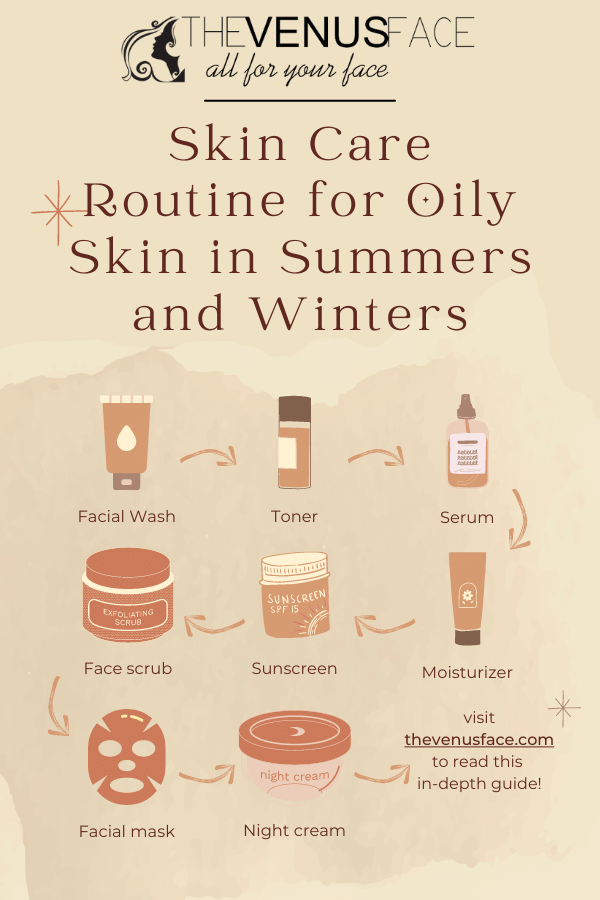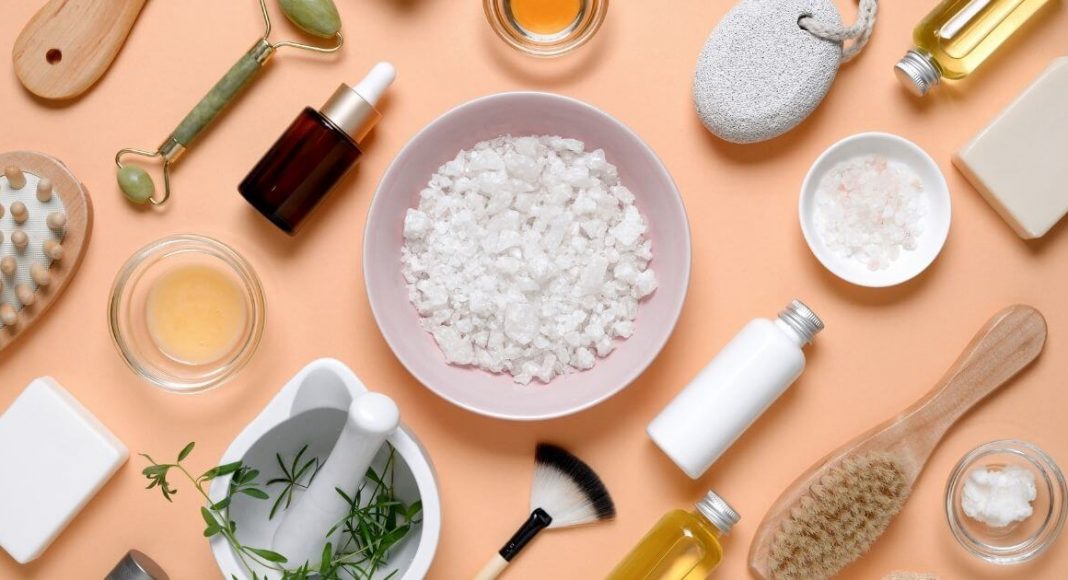We all know that oily skin can be more difficult to manage in the summer, but did you know it also has different needs depending on what season you’re in? Whether your skin is oily because of genetics or if you’re dealing with acne, there are ways to keep your complexion healthy and glowing. This blog post will give skin care routine for oily skin in both winters and summers, we’ll discuss how changing weather conditions affect the way we take care of our skins, making some recommendations for appropriate products throughout each season.

Best Skin Care Routine for Oily Skin in Summers
There is a natural reaction when we are hot and sweaty, our bodies produce more sweat to try to cool us down. This extra liquid helps regulate body temperature by powering the sebum glands in your skin with moisture so you don’t experience chapped lips or dry patches. However, too much extra hydration and sebum can also increase your chances of experiencing breakouts and/or shine, which is why it’s important to keep a proper skincare routine.
The following techniques may assist you in keeping your face oil-free:
Make use of face wash
Wash your face with a cleanser at least twice a day: in the morning and at night. It will help you get rid of any dirt that might be clogging the pores on your face, giving rise to oiliness and breakouts. Be careful though because some cleansers contain harsh chemicals which can irritate your skin further, causing more breakouts. An oil-free face wash is ideal for oily skin or acne-prone. If you don’t know where to start, check out this list of best face washes for oily skin.
More: Is Foaming Cleanser Good for Oily Skin?
Sunscreen is your bodyguard
Wearing sunscreen is a must for most skin types, but it’s especially important if you have oily skin. The sun emits harmful UVA and UVB rays, which can cause your pores to become engorged with oil and dead skin cells. Sun exposure will also make any scars or spots leftover from breakouts more noticeable, so keep your face safe by always wearing dewy sunscreen on sunny days!
The ideal sunscreen SPF is 30+, blocks out both UVA and UVB rays, and is water-resistant. Assuming you’re applying sunscreen only every few days, SPF 100 is the way to go. Otherwise, most of us can stick with SPF 50 and expect 98 percent protection. If you want to get tanned skin, SPF 30 is enough.
Moisturizers are still necessary
Some people think that oily skin does not need to use moisturizers. This is completely wrong because your face needs hydration even if the sebaceous glands are producing more oil. The right moisturizer can help reduce shine and control acne by preventing the skin from overproducing sebum.
Moisturizers should always be light, non-comedogenic (won’t clog pores), water-based, and fragrance-free. Check out this list of good examples of facial moisturizers for oily skin.
Use face scrubs to exfoliate
For oily skin, exfoliating is a must. Rough skin cells can trap excess oil, bacteria, and dead skin underneath the surface of your complexion. This will only worsen the condition of your face by giving rise to more breakouts or uneven texture, so you should exfoliate at least twice per week with an appropriate face scrub.
You should choose a face scrub that is made from natural ingredients or especially for oily skin. Regular scrubs may contain harsh chemicals which can irritate your skin, so it’s important to find a suitable, non-abrasive scrub for home use. The best choice would be a scrub that contains natural ingredients such as oatmeal or sea salt mixed with jojoba oil and/or salicylic acid. If you don’t know how to choose ideal face scrubs for oily skin, check out this list.
Face masks are nice!
Face masks can help absorb excess oil and eliminate dirt, make-up, and other surface impurities for individuals with oily skin. For people with oily skin, the finest facial mask will leave their faces clearer and pores unclogged. Consider using face masks in your spare time, ideally twice a week.
You should choose face masks with ingredients suitable for oily skin or make your own masks at home with ingredients found in your kitchen.
Toners are not a bad idea!
Toners/astringents are a necessary part of skincare. They clean out the pores, balance oiliness, and provide an even complexion for all skin types.
Toning your skin with a good toner can be the key to a long-lasting, hydrated, and balanced complexion. This is because most of us have seasonal changes in our bodies where some areas are more oily than others.
Use a toner or astringent twice a day, after waking up and before going to bed. If your skin is prone to drying or irritation, use it only once a day or every other day. You can choose a good toner/astringent for oily skin from this list or if you have spare time, make your own.
If you have to wear makeup, choose the right products.
Melting your makeup could trigger an outbreak of the clogged pore.
Meltdown in this hot summer season? Bad situation! The heat will make your skin oily and sweaty, which can lead to clogged pores. For oily skin, staying clean is the best choice because you have no oil regulating mechanism.
However, if you really have to put on makeup, make sure to choose the right products. Try makeup products that are water-based and non-comedogenic, or you can consider mineral powder foundation if your skin is oily.
If you’re not sure whether the makeup is safe for your skin type, consider checking reviews of other customers on the internet or ask a salesperson in the store! Or read this post below: Top CC Creams for Oily Skin Picked by Cosmetologists
Blotting paper is your friend!
Yes, you should carry blotting paper with you wherever you go to absorb extra oil throughout the day. When your face starts getting shiny, use a clean piece of blotting paper to dab away excess oil before it leaves ugly marks on your clothes.
Blotting papers are especially useful for oily skin to absorb sebum and give your complexion a matte, fresh look all day long. You can find some examples of high-quality blotting papers here.
Serums are optional
Oily skin is susceptible to breakouts and has larger pores. A serum created especially for oily skin can assist balance the complexion and make acne less bothersome.
When shopping for an oil-controlling serum, look for non-comedogenic components like sunflower seed oil or neem oil. You should also pay attention to the other ingredients in the serum because all serums are formulated differently.
If you’re not sure which one to pick, check out this list of the finest serums for oily skin or make your own serum at home.
Night creams can help, too!
A night cream is a great way to treat yourself after a long day. It can be used as an everyday moisturizer, but it will essentially do its job only at bedtime when you apply your face lotion before going into slumber mode!
The goal of a night cream is to make your skin feel and look refreshed in the morning. A great way for it to do this is by filling up with water – like when we drink our coffee after waking up from an all-night binge session on Netflix!
Night creams aim to deeply hydrate the skin, and provide it with essential nutrients such as collagen. They also work in clearing up dry patches by stimulating cell repair so your face can heal faster from any damage incurred over time!
More: Homemade Face Night Cream for Oily Skin You Can Make Easily
Best Skin Care Routine for Oily Skin in Winters
Now you’ve just finished reading a comprehensive guide on how to get rid of your oily skin in the heat. Honestly, summers are the worst for people with oily skin. Therefore, in the winter, your struggle with greasy skin will be much easier. Just use the oily skin care regimen in the summer and you should be fine throughout the winter. However, there are a few more tips that may assist you in combat with oily skin:
Avoid wearing heavy makeup
Since you have oily skin, it is best to avoid wearing heavy makeup during the summer AND the winter season. You may wear a light foundation and natural mascara at most.
If you know how to apply a tinted moisturizer correctly, it is still perfectly fine to use one for light makeup. Furthermore, CC creams and foundation primers that are designed particularly for oily skin should be considered.
No hot shower, just lukewarm water!
Baths in hot water are really nice during the winter. However, this causes our skin to dry up as a result of the loss of natural oils. As a result, after that, it is critical to use a lot of moisturizer or body lotion to balance it out.
Bathing in lukewarm water instead of a hot shower can give you better results for your oily skin.
Drink more water
In the winter, drinking water might be tough; we all want drinks that are both warm and comfortable. However, just remember to drink water on a daily basis to keep your skin healthy and flexible.
For people over the age of 18, it is recommended that ladies drink 2.7 liters of water per day while men should drink 3.7 liters, regardless of the season.
Avoid touching your face
Touching your face is a big no-no when it comes to acne. This spreads bacteria and could lead you down the path of breakouts or worse! However, if you have to touch your face, try to wash your hands before doing that.
Change pillowcase more often
Change your pillowcase at least once a week and wash the actual cushion every 3 months. If you have oily or acne-prone skin, change them even more frequently!
That is not all, silk is one of the finest pillowcase materials for people with oily acne-prone skin. It’s extremely soft, resulting in reduced friction between the cover and your skin, which can help to minimize skin irritation.
Use a humidifier in your room
There are a variety of irritants in the air that can aggravate your acne and make it worse. The pollutants in the air may accumulate on your skin, causing pimples.
A humidifier may be useful for individuals with oily skin. The skin will stay moisturized when the air is more humid. Therefore, humidifiers protect the sebaceous glands from overproducing oil to keep your skin hydrated.
Conclusion
Now that you’ve known all the steps to build a skincare routine for oily skin in both summers and winters. The next step is to try the skincare routine yourself to see if it works for you. After all, everyone has different skin types and requirements. Therefore, do not let this information overwhelm you! Follow the above-mentioned tips with a pinch of common sense and experience will guide you more than anything else.
Do share your thoughts in the comments below about how these work for you! And do check out other articles on the best things you could do to treat oily skin!


